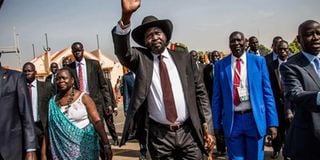Igad, global leaders accused of inaction over South Sudan crisis

South Sudan President Salva Kiir arrives for a political rally in Juba on March 18, 2015. Former South Sudan political detainees who left Nairobi Monday to Juba will know their new roles in the ruling party after meeting with President Kiir on Tuesday. PHOTO | ASHLEY HAMER |
What you need to know:
- The UN Office for the Coordination of Humanitarian Affairs (OCHA) says about 100,000 people have been displaced by the recent fighting in Unity state.
- South Sudan, which descended into chaos in December 2013, has had a recent eruption of violence between rebels led by Riek Machar and government forces in northern states where oil fields are concentrated.
- Reports about human atrocities in south Sudan are not new. Last year, Amnesty international documented a series of what it called "crimes against humanity", accusing both sides of killing people and raping women.
A global human rights lobby is accusing regional leaders and the international community of looking the other way as South Sudan plunges into renewed fighting.
A new situation report by Amnesty International says South Sudan’s war merchants, from both the government and rebels' sides, have been raping, killing and looting property from people in the past three weeks.
“The spike in fighting between the parties to the conflict is a clear indication that South Sudan’s leaders have little interest in a cessation of hostilities, while the region and the rest of the international community are reluctant to take bold steps towards addressing repeated atrocities,” Michelle Kagari, the deputy director for Amnesty International said on Friday.
South Sudan, which descended into chaos in December 2013, has had a recent eruption of violence between rebels led by Riek Machar and government forces in northern states where oil fields are concentrated.
On Thursday, the SPLM rebels claimed they had taken control of oil fields, a claim the government immediately rebutted.
CHASING AWAY MEDICAL WORKERS
The UN Office for the Coordination of Humanitarian Affairs (OCHA) says about 100,000 people have been displaced by the recent fighting in Unity state. On Friday, the Doctors without Borders (MSF) charity warned the spread of violence was chasing away medical workers.
“The escalation has left people in conflict areas exposed to violence and without much needed medical care and humanitarian assistance,” said Paul Critchley, MSF head of mission in South Sudan told reporters in Nairobi.
“All parties to the conflict must respect civilians and healthcare structures in order to prevent even more unnecessary suffering,” he added.
MSF says it has about 3,500 medics in six of South Sudan’s states, but it has been compelled to fold up some of its operations after its workers were targeted and flights for supplies curtailed.
Reports about human atrocities in south Sudan are not new. Last year, Amnesty international documented a series of what it called "crimes against humanity", accusing both sides of killing people and raping women.
The lobby, together with Human Rights Watch, called for targeted sanctions on war merchants and called for the United Nations Security Council to impose an arms embargo on South Sudan.
IGAD BLAMED FOR FAILURE
AI is repeating the same demands in its new situation report, as it blames the failure on the Intergovernmental Authority on Development (Igad), which has been midwifing peace talks.
Igad is composed of Kenya, Uganda, Sudan, Ethiopia, Somalia, Djibouti and South Sudan.
Igad mediators, sitting in Addis Ababa, Ethiopia, have led the parties to sign seven ceasefire agreements since December 2013. All of them were broken within days.
The mediators have also faced rejection from the South Sudan government side, which accuses Ethiopia of favouring rebels.
Sources said the Troika countries (US, UK and Norway), who had been financing the talks, asked to take a lead role but the move was opposed by President Salva Kiir as well as the region.
“The Troika have not been rejected. It is just that they wanted to come in with the view of imposing sanctions. They wanted to fix the problem quickly and get credit for it,” James Morgan, South Sudan’s deputy ambassador to Nairobi told the Nation.
“We wanted a comprehensive solution so that no future problems can emerge. We believe Africa can help us do that. Troika are welcome to be observers.”
OPPOSE ANY SANCTIONS
This week, a meeting of regional leaders under the International Conference on Great Lakes Region (ICGLR), a 12-member bloc, agreed to oppose any sanctions and asked the international community to give the region a lead role in conducting talks.
“No UN sanctions, whether targeted sanctions or arms embargo, be imposed on South Sudan, as these would be counter-productive and only serve to exacerbate the situation,” the ICGLR meeting in Luanda, Angola agreed on Monday.
“We welcome the supporting and observer role of the CPA Troika (Governments of Norway, USA and UK) in the South Sudan Igad-led peace process, and urge them to continue their positive engagement without directly participating in the mediation process.”





